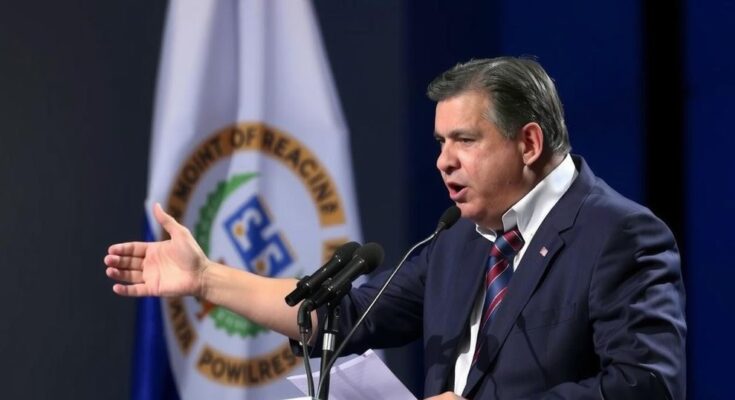Uruguay’s conservative candidate Álvaro Delgado conceded defeat to left-wing challenger Yamandú Orsi in a closely contested presidential runoff. Orsi, with 49.56% of the vote, aims for national unity while facing economic challenges. His moderate approach promises no radical reforms but continues previous social welfare successes. The election marks significant political change, reflecting broader global trends in voter dissatisfaction with incumbents.
In a closely contested presidential runoff, Álvaro Delgado of the ruling conservative coalition conceded defeat to the left-wing challenger Yamandú Orsi on Sunday. This election reflected a broader trend of voters worldwide rejecting incumbent governments amidst economic dissatisfaction following the pandemic. With over 91% of votes counted, Orsi garnered 49.56% compared to Delgado’s 46.17%. Celebrating his victory, Orsi emphasized the need for unity in a divided nation. Despite discontent with economic issues and rising crime, he does not plan significant changes, aiming instead to enhance investment and social programs within the context of the prior Broad Front government. Former President José Mujica’s endorsement underscores Orsi’s commitment to moderate reforms, aligning with past progressive policies, such as expanding social protections.
Delgado, facing mounting resentment over economic stagnation and public safety concerns, acknowledged Orsi’s victory and stated his willingness to facilitate a smooth transition. Voter turnout was notably high at 89.4%, indicative of the public’s engagement in key political changes. Orsi’s willingness to call for national dialogue signals a conciliatory approach to governance, promising collaboration across the political spectrum after a fiercely competitive campaign. This election might signal broader shifts in political landscapes across Latin America as citizens express their frustrations with the status quo.
The recent presidential runoff in Uruguay saw the center-right coalition concede to the left-wing candidate, signaling a pivotal change in leadership after five years of conservative governance. This election is part of a larger global trend where voters influenced by post-pandemic economic hardships are increasingly rejecting established parties in favor of alternatives. The broader implications of this election extend beyond Uruguay, resonating within various international contexts where discontent against current administrations is prevalent.
Yamandú Orsi’s victory in Uruguay represents a significant political shift as the nation grapples with persistent economic challenges. His approach, characterized by moderation and inclusivity, aims to foster unity while addressing critical issues such as poverty and crime. As the center-right coalition steps down, the transition period promises an opportunity for comprehensive governance focused on investment and social welfare, aligning with Uruguay’s established progressive policies. Orsi’s leadership could mark a constructive response to the electorate’s demand for change amid global political currents.
Original Source: www.thoroldtoday.ca




